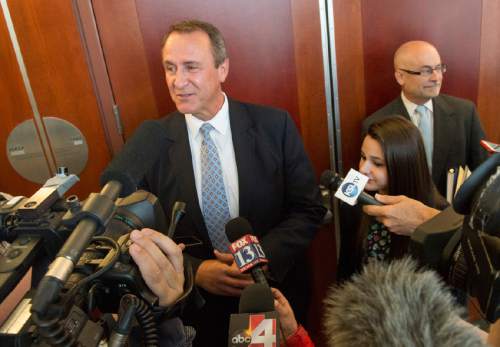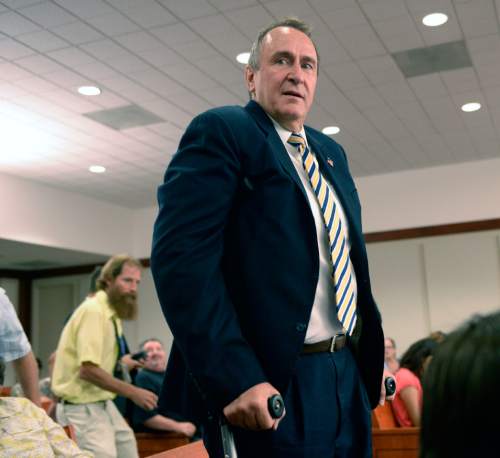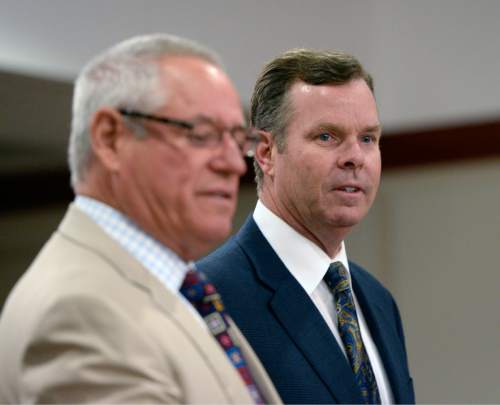This is an archived article that was published on sltrib.com in 2015, and information in the article may be outdated. It is provided only for personal research purposes and may not be reprinted.
Five days before his scheduled preliminary hearing was set to begin, former Utah Attorney General John Swallow waived the proceeding Wednesday, moving his case one step closer to trial.
Swallow, 52, is charged with 14 criminal counts alleging corruption while he was Utah's top law-enforcement officer.
The former GOP officeholder has maintained his innocence since his arrest last year and is expected to plead not guilty to the charges in 3rd District Court on July 20.
Swallow's defense attorney, Stephen McCaughey, said Wednesday he could see no benefit to going through with the weeklong preliminary hearing, because the standard of proof is so low and the evidence gathered by investigators is widely known.
It would be unlikely, he said, for a judge not to send the case to trial.
"We can't put up any evidence that would do us any good [during a preliminary hearing]," McCaughey said. "This way, we'll be able to present the whole thing to a jury."
A preliminary hearing is the prosecution's first chance to spell out its case and prove to a judge that there is enough evidence to support the charges. Court rules also require that a judge must favor prosecutors, not defendants, in considering whether to order a trial.
Prosecutors had expected to call more than 30 witnesses to testify during Swallow's now-canceled hearing, including convicted businessman Marc Sessions Jenson, indicted businessman Jeremy Johnson, former Chief Deputy Attorney General Kirk Torgensen, other lawyers from the attorney general's office and some Swallow campaign staffers.
"This is how the process sometimes works," Salt Lake County District Attorney Sim Gill said Wednesday. "We're happy that the process is moving forward, and Mr. Swallow is entitled to the presumption of innocence."
The decision to waive the hearing, McCaughey said, is not an indication that prosecutors have offered Swallow a plea deal.
"There is no deal on the table," he said. "This is a straight-up waiver."
Gill did not dispute that characterization and said his office placed "no conditions" on Swallow in agreeing to forgo the hearing.
Bypassing a preliminary hearing carries benefits and risks for defendants, according to Utah defense attorney Steve Burton.
On the plus side, such hearings provide a chance to hear the evidence and question prosecution witnesses under oath, which can help build a defense.
"That gives the defense attorneys ammunition they can use at trial," Burton said, "going back to the statements witnesses made on the stand at the preliminary hearing if the stories change or witnesses contradict themselves."
A big drawback, however, is that prosecutors also can demonstrate publicly that they have significant evidence.
"Right now, they [defense attorneys] may be able to say, 'We have these defenses, and the case isn't as strong as you think,' " Burton said. "But once the state does a prelim and they come in with mountains of evidence, it makes it much harder to make that case to the public."
When plea negotiations are under way, waiving a preliminary hearing can be a defendant's "best bargaining chip," Burton said. That's because prosecutors may be inclined to offer a better deal to a defendant who agrees to skip the hearing and move quickly to accept responsibility for a crime.
Either way, Burton said, Swallow's case seemed destined for trial.
"The chances of the case not being bound over," he said, "are close to zero."
Swallow resigned in late 2013 — after less than a year as attorney general — amid an investigation into allegations that both he and his predecessor, former Attorney General Mark Shurtleff had established a pay-to-play culture inside the office that saw both men take bribes to ignore or protect big campaign donors whose business practices could land them in legal trouble.
The charges — brought jointly in July 2014 by Gill, a Democrat, and Davis County Attorney Troy Rawlings, a Republican — followed months of investigative work by county, state and federal authorities, state lawmakers and the lieutenant governor's office.
Shurtleff, Utah's attorney general for 12 years, handpicked Swallow, once his chief deputy, as his successor.
For his part, Shurtleff is charged with nine felonies, including bribery, illegally accepting gifts and obstructing justice. As of Wednesday, a five-day preliminary hearing in his case remained set for June 15. Rawlings' office is handling the case.
Swallow is charged with 13 second- and third-degree felonies and one misdemeanor, including counts of money laundering, misuse of public funds, obstruction of justice and falsifying government records.
If convicted, Swallow and Shurtleff could spend up to 30 years in prison.
Robert Gehrke contributed to this story.







